
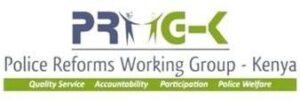
NAIROBI, 31 January 2025: The Law Society of Kenya and the Police Reforms Working Group are horrified by the discovery of the bodies
of Justus Mtumwa and Martin Mwau, two of the four missing Mlolongo abductees. We send our deepest condolences to their families and friends. We join them in demanding an independent post-mortem to determine the cause of death.
We call upon the Independent Policing Oversight Authority to thoroughly investigate their abduction and killing and bring perpetrators to justice. We urge the Directorate of Criminal Investigations as instructed by the court to urgently, effectively, impartially, and transparently investigate the abductions of Steven Mbisi and Kalani Mwema and ensure their safe return to their families.
We demand that the National Police Service now establish a missing persons database to ensure efficiency, seamless interagency communication, and quick communication with victim families to resolve missing persons cases.
We remain concerned by admissions under oath by the Inspector General of Police and the Director of Criminal Investigations on 30 January 2025, that they did not have any knowledge of where Justus Mtumwa and Martin Mwau were despite the two men’s bodies were delivered to the Nairobi Funeral Home by officers from Ruai Police Station. We call on those who continue to threaten and harass some of the former abductees to stop.
We remind the authorities that the gravity of these issues had prompted 20,000 Kenyans to sign a petition calling for a commission of enquiry in July 2024. The time has come for this initiative to be put in place now.
Kenya continues to experience an unprecedented number of abductions and killings with no satisfactory answers from government agencies mandated to protect the safety of all Kenyans. Since June 2024, Kenya National Commission on Human Rights has recorded over 63 cases of extrajudicial killings, 89 enforced disappearances with 29 people still missing. The police have made no progress in holding those responsible for these human rights violations to date.
Notes:
https://x.com/HakiKNCHR/status/1873824527857463439
https://www.amnesty.org/en/petition/stop-the-crackdown-on-people-in-kenya/
This statement is signed by the Law Society of Kenya and the Police Reforms Working Group, an alliance of national and grassroots organizations committed to professional, accountable, and human rights-compliant policing. They include: Independent Medico-Legal Unit (IMLU), Kariobangi Paralegal Network, Defenders Coalition, Social Justice Centres Working Group (SJCW), Kenyan Section of the International Commission of Jurists (ICJ Kenya), International Justice Mission (IJM-K), HAKI Africa, Amnesty International Kenya, Women Empowerment Link, Social Welfare Development Program (SOWED), Kenya Human Rights Commission (KHRC), Federation of Women Lawyers (FIDA- Kenya), International Centre for Transitional Justice (ICTJ – Kenya), Transparency International Kenya, Shield For justice, Wangu Kanja Foundation, Constitution and Reform Education Consortium (CRECO), Kenyans for Peace, Truth and Justice (KPTJ) and Peace Brigades International Kenya (PBI Kenya).
Dear Partner, Colleague and Comrade,
In this newsletter, you will find updates on our ongoing projects, successful campaigns, and impactful initiatives to enhance the safety and security of human rights defenders in Kenya.
We’d like to encourage you to take a moment to read through the newsletter and familiarize yourself with the important work we are doing. We also invite you to share the newsletter within your networks to help raise awareness and amplify our collective efforts.
Human Rights Defender Richard Raymond Otieno murdered in Molo, Nakuru County
19 January 2025, Nairobi, Kenya
The Defenders Coalition is deeply shocked and saddened by the brutal murder of Richard Raymond Otieno, an outspoken political commentator and human rights defender based in Molo Town, approximately 328 kilometres from Nairobi.
Preliminary reports indicate that Richard was attacked by unknown individuals. His lifeless body was found Sunday morning, 19 January 2025, near the gate of his rented apartment.
A dedicated youth leader, Richard was known for his human rights advocacy, championing good governance and the rule of law in Nakuru County and beyond.
His tragic death marks yet another grim reminder of the growing dangers faced by human rights defenders and political commentators in Kenya.
The murder of Richard adds to the worrying trend of targeted killings of human rights defenders in the country, including the case of Paul Ndirangu Kioi- also a Molo-based human rights defender – whose life was violently taken in 2020. These heinous acts not only silence critical voices but also threaten the principles of democracy and accountability that underpin a just society.
We call on the authorities to swiftly, impartially, and transparently investigate this case to ensure that those responsible are held accountable.
The Defenders Coalition stands in solidarity with Richard’s family, friends, and the human rights community.

NAIROBI, Kenya, January 12th, 2025 – Civil Society Organizations Condemn the Abduction of
MARIA SARUNGI Tsehai.
Civil Society Organizations, under the umbrella platform of Civic Freedoms Forum (CFF), strongly
condemn the abduction of Maria Sarungi Tsehai, a Tanzanian media and communications expert and
a tough critic of President Samia Suluhu who does not shy away from writing articles highlighting the
rot in the Tanzanian government. This is a blatant violation of both domestic and international legal
commitments by Kenya.
We are concerned that this could be part of the broader trend of forced renditions in Kenya, including
abduction of Ugandan opposition leader and activist Kizza Besigye, the kidnapping of Turkish
nationals, South Sudanese activists, and Ethiopians, as well as the unresolved disappearances of 36
Ugandans in Kisumu. These incidents continue to undermine Kenya’s image as a haven for democracy
and human rights, while creating fear among political dissidents, refugees, and whistle blowers.
Kenya, as a signatory to international human rights treaties such as the 1951 Refugee Convention
and the African Charter on Human and Peoples’ Rights (ACHPR), has a heightened obligation to
uphold due process and prevent forced removals. If action is not taken by the state, impunity will
become entrenched hence jeopardizing regional stability and the values enshrined by the
international community and the EAC.
We strongly condemn the Kenya’s National Intelligence Service (NIS) and National Police Service
(NPS) for failing to act to prevent these acts as well as failing on their legal and constitutional duty to
protect individuals within its borders.
We, therefore, call upon:
• Kenyan government to reaffirm its commitment to the rule of law by launching an
independent investigation into the incident and ensuring such practices do not become the
norm.
• For full and immediate accountability from the both Kenyan and Tanzanian Government on
this incident.
Signed by
ARTICLE 19 Eastern Africa
Constitution and Reform Education Consortium – CRECO
Defenders Coalition
Kenya Human Rights Commission – KHRC
Muslims for Human Rights- MUHURI
Partnerships 4 Empowerment and Networking in Kenya (PEN KENYA)
Independent Medico-Legal Unit – IMLU
lnuka Kenya Ni Sisi!
lnformAction TV Haki Yetu Organization
Initiative for Inclusive Empowerment – IIE
Transparency International – Kenya
AfricanDefenders and its network members and partners are deeply concerned and disturbed by recent news of the unjustifiable imposition of a restriction on the Network of Human Rights Defenders in Central Africa (REDHAC) to operate throughout Cameroon. AfricanDefenders and all its member networks believe this decision is unfounded and based on misleading and non-factual information.
An official letter signed by Cameroon’s Minister of Territorial Administration states that: ‘The association known as the “Central African Human Rights Defenders Network” (REDHAC) is null and void for lack of authorisation and activities likely to undermine the integrity of the national financial system’.
Such decisions and allegations appear to be part of a disinformation campaign. They contradict the recent amendments and reforms acknowledged by the Financial Action Task Force (FATF) regarding non-profit organizations (NPOs).
We strongly and unequivocally reject these unfounded concerns about financial integrity. We firmly believe that the Cameroonian authorities’ move aims to undermine REDHAC’s critical work in Central Africa and Cameroon.
“The erosion of civic space in Cameroon has reached alarming levels, with repressive measures and unlawful administrative decisions becoming a distressing norm. These tactics undermine the fundamental rights and freedoms that are the backbone of any democratic society. We strongly condemn these actions and draw Cameroon’s financial partners to stand firm against the State’s suppression of civil society organizations (CSOs),” Says Hassan Shire, Chairperson of Pan-African Human Rights Defenders Network and Executive Director of DefendDefenders
Despite the October 2023 Best Practices Guide to States released by the FATF, which was designed to protect relevant NPOs and ensure legitimate activities are not disrupted, the Minister of Territorial Administration of Cameroon has chosen to implement the poor practices highlighted in the FATF’s recommendations.
Administrative decisions must be firmly grounded in existing laws, policies, and procedures. They cannot be made arbitrarily; a solid and justifiable legal foundation is imperative. The arbitrary suspension of REDHAC, executed without prior notice, is without lawful basis and constitutes a violation of the freedom of association stipulated in Cameroonian law and international human rights law. This decision directly undermines the crucial work of human rights defenders who advocate for rights and freedoms.
Legal channels and appropriate investigative agencies must operate strictly within the law if there are suspicions of wrongdoing. In the absence of evidence, as is clearly the case with REDHAC, the suspension of all their activities must be lifted immediately.
This decision equally unduly disrupts and discourages REDHAC’s legitimate activities. It goes against Cameroon’s obligations under the United Nations Charter, the African Charter on Human and Peoples’ Rights, and the guidelines of the African Commission on Human and Peoples’ Rights on Freedom of Association and Assembly in Africa.
“The state repression in Cameroon has reached a turning point, contrary to its commitments under international laws and standards. Systemic attacks have targeted journalists, civil society organizations, and pro-democracy activists. Such regression indicates that the days ahead are bleak,” says Prof Adriano Nuvunga, Chairperson of the Southern Africa Human Rights Defenders Network.
We recognize and appreciate the profound impact of REDHAC’s efforts, particularly in the context of restricted civic space in Cameroon. REDHAC’s work is of the utmost importance, as it positively contributes to human rights advocacy in Central Africa and offers hope in the fight for fundamental rights and freedoms.
‘Human Rights Defenders play a vital role in protecting and advocating for human rights and freedoms as outlined in laws and international treaties. These rights are fundamental and should not be arbitrarily limited. The suspension of REDHAC comes amidst rising reports of human rights violations, including silencing, intimidation, and harassment, which is a troubling trend that requires international attention. We particularly stand in solidarity with our sister Maximilliene Ngo Mbe, during this period,” says Mary Pais, Co-Director African Initiative of Women Human Rights Defenders
We condemn any intimidation move by the Cameroonian authorities, including administrative summonses and threatening statements.
Therefore, we urge the minister to reconsider this decision and engage in a constructive dialogue with REDHAC. This dialogue is key to resolving the current situation and ensuring REDHAC’s work continues.
“Those in authority positions have the responsibility to ensure that rights and freedoms are respected and protected. Human rights are not just words; they reflect people’s hopes for dignity and humanity. Protecting these rights is a collective obligation, including that of the State. An injustice against one is an injustice against all,” says Kamau Ngugi, Chairperson of East and Horn of Africa Human Rights Defenders Network
We call on the Cameroonian authorities to adhere to the commonly agreed-upon best practices paper by FAFT. This document provides clear examples of poor practices to avoid. It offers guidance on implementing measures proportional to assessed risks without imposing undue burdens on the non-profit sector. END
For more information, contact :
Joseph Bikanda: JosephB@africandefenders.org
Prof. Adriano Nuvunga: adriano.nuvunga@cddmoz.org
Mary Pais Da Silva : mary@whrdinitiative.africa
Nicolas Agostini: nicolasa@defenddefenders.org
25th November being the International Day for the Elimination of Violence against Women, marks the commencement of the 16 days of activism against all forms of gender-based violence against women and girls. During this period, collective voices are raised to air the plight of women and girls calling for the end of all forms of gender-based violence to include, physical, emotional and psychological against them. In addition, states are especially tasked with putting in place effective measures to curb the increase of GBV and to eliminate the same in totality. Unfortunately, we have not been successful in curbing these vices in totality as more and more cases of GBV to include SGBV continue to be reported, this is despite the fact of having in places laws that address some of these unfortunate issues.
What is more concerning to me as the 16 days commence, is the nature in which femicide cases are being addressed in this country. Femicide, the intentional killing of women based on their gender, becomes one of the worst forms of gender-based violence women and girls experience. Femicide Count Kenya, an organisation dedicated to tracking femicide cases in Kenya, recorded that at least 500 women were victims of femicide between 2017 and 2024. Although this is what has been reported, there is a likelihood that there are more cases which have not been brought to light. This is year alone, in three months between August and October it was reported that 97 women had been killed. In a period of three months, that is a very significant number and cannot just be ignored. The discovery of women’s decomposing and dismembered bodies in Kware area, Mathare was harrowing. The recent attempted murder of Florence Wanjiku in Nakuru County, having been stubbed 18 times and her some of the fingers chopped of depicts a picture of society that cares less about women and the violence they endure.
Women in this country and those who care about women’s rights have marched, held rallies, drafted petitions and even started movements to address and end femicide in the country. Despite the call to have femicide declared a national disaster, the same remains to be seen, a mirage at a distance. One of the asks and which I support fully is the criminalisation of femicide in totality, the same is yet to be fully addressed. It is rather unfortunate that despite calls for action to be taken, women and girls have been killed while their perpetrators continue to walk free. Where is the justice for all those women who have lost their lives in some very inhumane ways. For those prosecuted and convictions upheld, have been a result of collective noise from the public and civil society. People cannot seat back, arms folded while victims have no justice and families left with deep wounds, they only are aware of. We need to see more prosecution of perpetrators of femicide even as we discuss its criminalisation. The numbers mentioned above are actual women, not just figures, whose lives were cut short because someone felt they could. It cannot be business as usual as such atrocities continue being witnessed in our present times.
The appointment of the 12 members committee to develop policies on femicide in sports and the country is rather reactionary rather purposeful, this can be viewed as the sacrifice offered to appease the ‘gods’. Femicide is not a foreign concept in Kenya, it has been present. Unfortunately, despite this fact, little to nothing has been done to curb it and especially from the states side. The development of polices and laws is one thing and the implementation is another. There is need for clear and proper commitment from the government, all arms of it, to comprehensively address femicide once and for all. Women are tired of marching and demanding for the respect and protection of their human rights, they can only shout so loud and jump so high. We cannot be waiting for more women to be killed, or 16 days of activism to raise these concerns. There must be deliberate and demonstratable efforts to address and end femicide in Kenya.
Wallace M Nderu, Advocate of the High Court and Research and Advocacy Advisor, Defenders Coalition
Winners of the 2024 Human Rights Defenders Announced in Nairobi
The Working Group on Human Rights Defenders, in collaboration with the Defenders Coalition and the Embassy of Denmark in Kenya, extends its warm congratulations to the winners of the 2024 Human Rights Defenders Awards (#HRDAwardKE). The awards ceremony, held on November 29, 2024, in Nairobi, recognized individuals who have demonstrated exceptional courage, creativity, resilience, innovation, commitment, and selflessness in advancing human rights and social justice in Kenya.
These awards aim to inspire and encourage ordinary citizens to actively engage in their communities by speaking truth to power and championing constitutionalism. Since their establishment nine years ago, the HRD Awards have honored extraordinary individuals who relentlessly advocate for human rights. This year, six defenders were celebrated for their groundbreaking contributions in four categories:
Below is the complete list of winners in each category:
Upcoming Human Rights Defender of the Year Award
In recognition of your exemplary contribution towards the promotion and protection of mental health rights in Kisumu County and beyond.
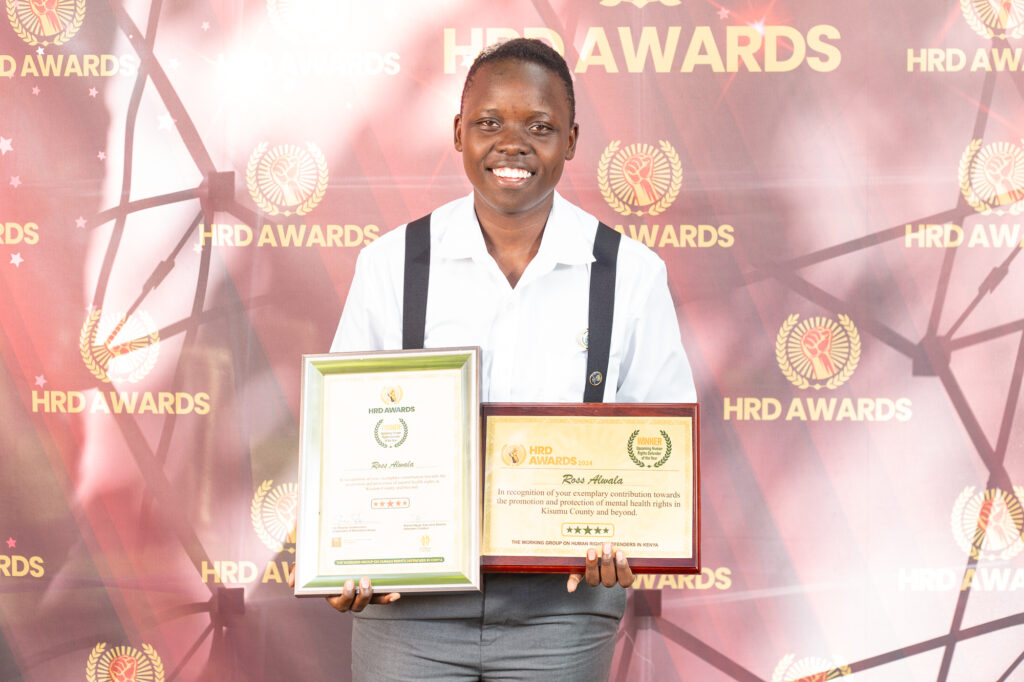
Human Rights Defender of the Year Award
In recognition of your exemplary courage, consistency, innovation, and creativity in advancing good governance, constitutionalism, rule of law, and the promotion and protection of human rights and fundamental freedoms in Kenya.
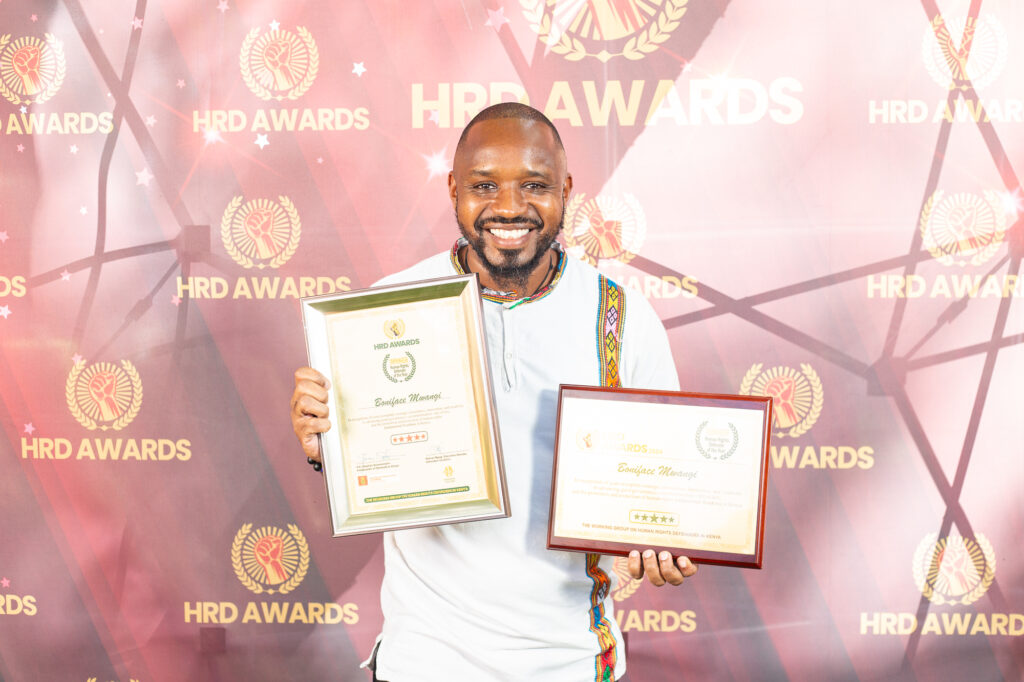
In recognition of your exemplary courage, contribution towards the promotion and protection of human rights and access to justice for survivors and families of victims of rights violations in Kenya.
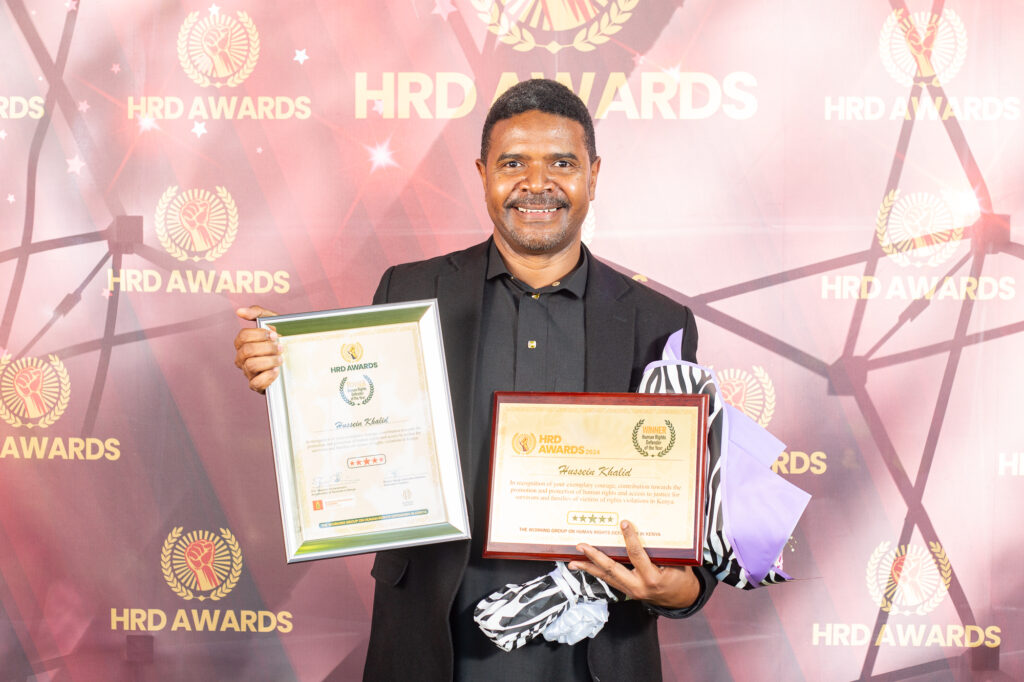
In recognition of your exemplary dedication to the promotion and protection of human rights, public accountability and integrity in Kenya.
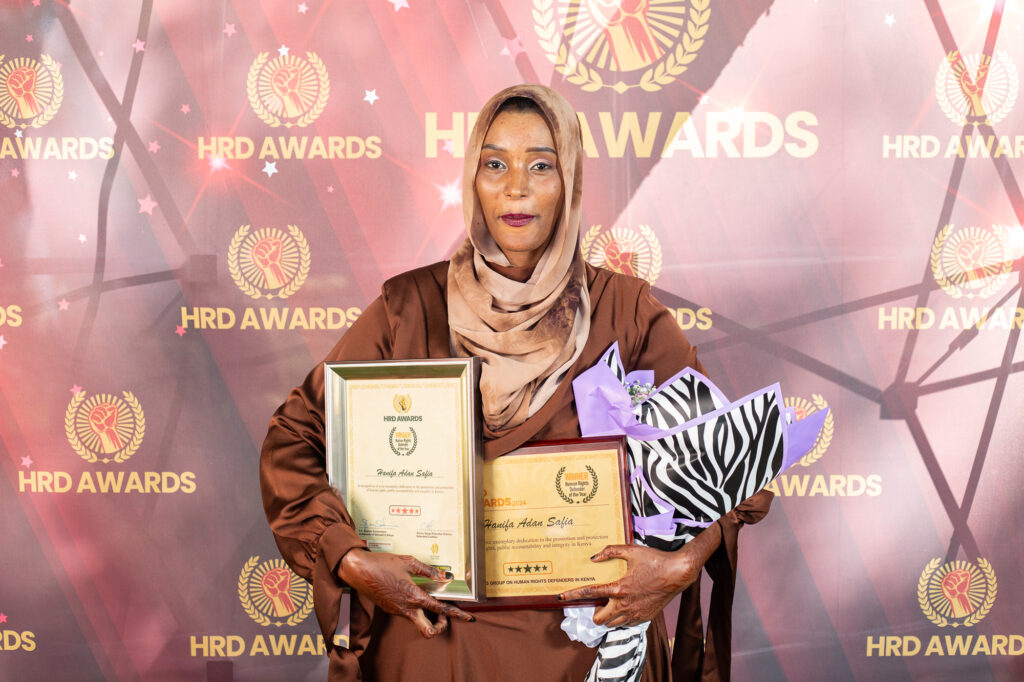
Munir Mazrui Lifetime Achievement Award
In recognition of your courage, extraordinary resilience and trailblazing leadership in transforming personal loss into a powerful solidarity and advocacy network for families of victims of enforced disappearances, extrajudicial killings and police brutality in Kenya’s informal settlements. (Posthumous)
Global Solidarity Award
In recognition of your inspiration and solidarity with global struggles against human rights violations, imperialism, racial discrimination and inequality across the globe.
Popular vote Award
In recognition of your outstanding courage, integrity in public service and standing for public good.
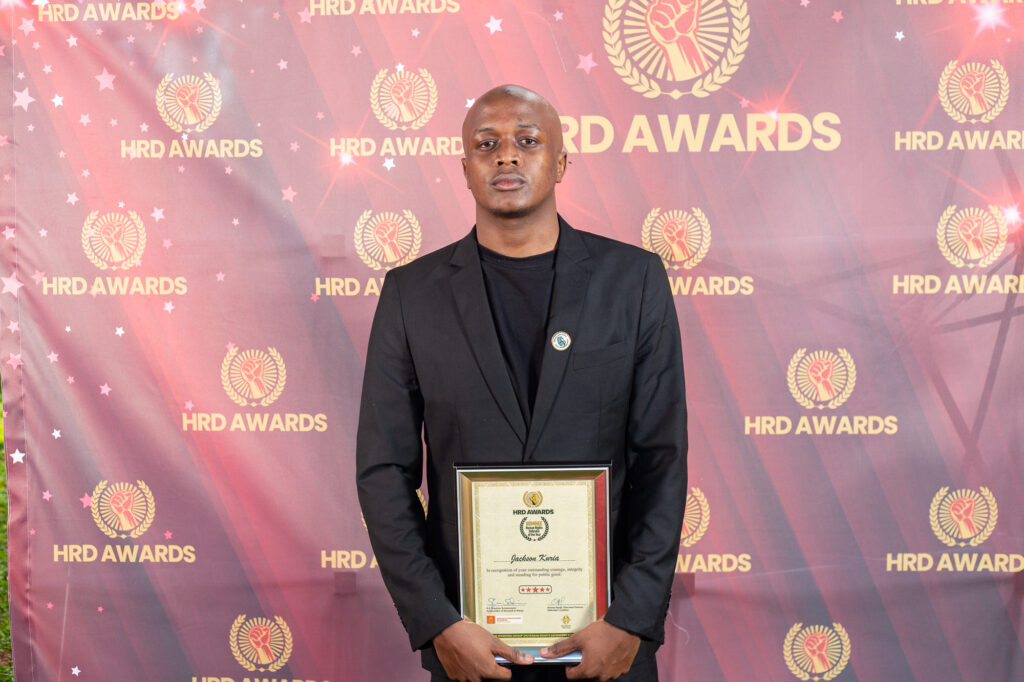
ABOUT THE HUMAN RIGHTS DEFENDERS AWARDS
Advocating for the respect of Human Rights is high risk. Groups and individuals who walk this road are often the targets for reprisals by authorities and private groups who make use of various forms of repression to silence them. The “Declaration of the Rights and Responsibility of individuals, groups and organs of Society to Promote and Protect Universally Recognized Human Rights and Fundamental Freedoms” was adopted in December 1998 and defines these advocates as human rights defenders.
The Defenders Coalition and the Working group on Human Rights Defenders (WGHRD) have played a pioneering role in the protection and recognition of human rights defenders.The WGHRD launched the inaugural Human Rights Defenders(HRD) awards in 2016 to:
Boniface Mwangi activated the Finance Bill protests of 2024, on a personal level. Soon after, activists and individuals from all walks of life, in various parts of the country, joined in championing for better governance of the country. Eventually, the government withdrew the Finance Bill and a new gave of holding government accountable has been witnessed since.
But, this is just one of the significant achievements in Mwangi’s life. He epitomises a just society.
Mwangi is synonymous with the fight against social injustice, impunity, corruption, and bad governance. He has remained steadfast in his commitment to constitutionalism, the rule of law, and the protection of human rights, even in the face of threats and intimidation. Mwangi has fearlessly defended victims of injustice, putting his own safety at risk. He believes in the inherent right of every human being to justice, equity, and freedom.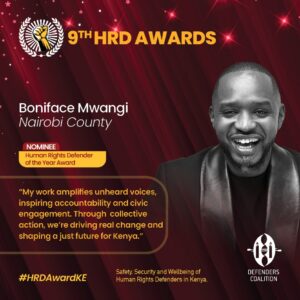
At 41, Mwangi has been arrested numerous times for his activism. His commitment to social change has also come with a heavy price for his family, who have faced harassment and threats. The escalation of these hostilities has seen him threatened with harm and/or death by forces in government. Despite these challenges, he remains undeterred.
Mwangi’s journey as an activist began after the 2007 post-election violence, which he witnessed firsthand as a newspaper photographer. The trauma of covering such horrific events, perpetuated by the same politicians he was reporting on, fueled his desire for change.
His first initiative, Picha Mtaani, was a traveling street exhibition showcasing photographs of the 2007 violence. This project aimed to spark dialogue and promote national healing. Subsequently, Mwangi launched initiatives like MaVulture and Team Courage, focusing on fighting impunity, challenging corrupt leadership, and advocating for peace. In 2010, Mwangi founded PAWA 254, an organization that uses art to address social issues and empower communities. PAWA leverages the power of art to raise awareness, inspire change, and promote positive development.
Mwangi’s tireless efforts have earned him numerous accolades, including the CNN Multichoice Africa Photojournalist of the Year Award, the Prince Claus Laureate, and recognition from Time magazine as a Next Generation Leader.
He leverages his social media influence to address social ills and to inspire everyday Kenyans to aspire for a greater, better nation. His denunciations of corruption and impunity are strident convictions. Mwangi continues to wage a spirited campaign against oppressive establishments.
Although at one point he stood alone, today, Mwangi has created a movement – inspired by his vision and consistency – adding their voices to champion for a better Kenya.
Noor Bashir Shuria is a human rights defender who, for close to a decade, has dedicated his life advocating for human rights and fundamental freedoms while based in Garissa, northern Kenya.
Noor’s awakening on human rights advocacy came following the terror incidents in Ijiara and Hulugho Sub Counties when the towns experienced violent retaliation from both security forces and Al Shabaab militia, leading to a rise in arbitrary arrests, extrajudicial killings and enforced disappearances. Witnessing the pain and suffering of the victims’ families motivated the 31-year-old to monitor, document, report and follow up on such cases, which are rampant in Garissa County.
As a human rights defender, Noor work includes civil and political rights, pushing for the freedoms of assembly, association, and expression. He firmly believes that citizens should be able to exercise their rights as enshrined in the law, advocating for reforms and accountability in a country struggling with resource wastage, poor governance, and diminishing accountability. He recognizes that socio-economic rights are equally important, actively promoting the right to health and education. Noor asserts that a healthy and educated population is empowered and capable of withstanding challenges and adversities.
The conversation around environmental protection and climate justice is also integral to Noor’s work. He acknowledges the importance of a clean and healthy environment, incorporating environmental rights into his advocacy efforts. He emphasizes that refugees, migrants, and displaced persons also have rights and freedoms, which must be upheld within existing legal frameworks. This focus leads him to address the plight of displaced individuals and seek ways to facilitate their integration into communities and broader society.
Noor takes pride in his work and has strategically employed various methods to ensure that his efforts are meaningful. He emphasizes the importance of research and documentation, recognizing that data is critical for effective advocacy. Additionally, through lobbying and engagement, he has successfully connected with diverse policymakers and duty bearers, including regional and international mechanisms. By raising public awareness, utilizing social media, and conducting community outreach programs, he has engaged with the community and empowered them through accurate information dissemination. His partnerships and networks further strengthen his mission of promoting and protecting rights and fundamental freedoms.
Despite challenges such as the vast area he covers, limited resources, and a lack of recognition from local administration, Noor is proud of the successes he has achieved. Although they may seem small, Noor celebrates victories in community empowerment, policy reforms, increased awareness, and some legal achievements. He draws inspiration from survivor stories, grassroots movements, and collaborations with like-minded individuals. He acknowledges that his Bachelor’s degree in Community Development from Garissa University has played a crucial role in his work, noting that timely interventions in cases involving security forces have averted potential catastrophes.
Currently, as a practicing paralegal, Noor is committed to ensuring access to justice for victims of various injustices, including extrajudicial killings within Garissa County, despite facing significant security threats and cultural barriers in his human rights work.
Noor’s contributions have earned him several certificates in recognition of his role as a community watchdog, as well as multiple paralegal and human rights defender awards. His unwavering commitment to justice, loyalty, compassion, and support for legal aid services has garnered him respect across diverse backgrounds and faiths, making him a beloved figure both in Garissa and beyond.